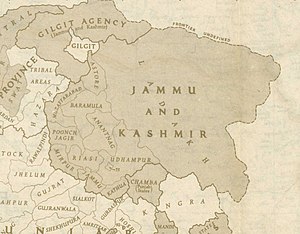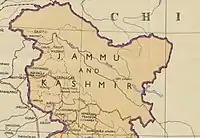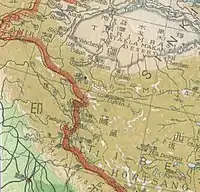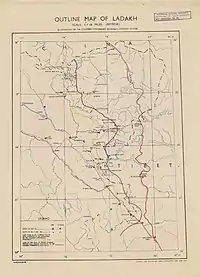Forward policy (Sino-Indian conflict)
Forward policy in the context of Sino-Indian border conflict was a term coined by the Indian Army to refer to an Indian government directive instructing it to establishg "forward" posts (advance posts)[1] in order reclaim territory occupied by China. Much before India's decision, China had been carrying out its own version of such a forward policy by militarising its perceived border, and attacking and apprehending any Indian patrols that venured into it. Later, China cited India's forward policy as the causus belli for initiating the 1962 Sino-Indian War.
China
Wendy Palace, a founder member of the Tibet Society at Cambridge University, writes that China had a forward policy before 1904, but in the following years the nature of China's changed to a more western approach.[2] China's forward policy in the early to mid 1900s in Tibet brought Chinese boundaries in contact with Indian boundaries.[3] China started pushing is borders further into India and Himalayan states and regions of Ladakh, Uttaranchal, Nepal, Sikkim, Bhutan and Arunachal Pradesh. India's reactionary and defensive forward policy was thus conceptualized; to which China took offensive.[4]
With respect to China's forward policy Indian diplomat T. N. Kaul wrote:[5]
China's radical leaders… wanted China to become the leader of the communist world and the "Big Brother" in Asia, with a string of client states around it… India seemed to be the main obstacle in extending China’s hegemony over Asia and then assume the leadership of the Third World… This was China’s "forward policy" against India. She wanted to show the Third World that India was military weak, socially decadent and economically dependent on Western aid.
India




Forward policy with respect to India refers to political and military decisions taken in the early 1950s and onwards, but usually specifically refers to the policy adopted in late 1961 in the context of Jawaharlal Nehru, the Sino India border relations and the 1962 war. The forward policy adopted in late 1961, on 2 November 1961,[6][7] has been used to explain and justify the war launched by China in October 1962.[8][9] While the Henderson Brooks–Bhagat Report opined that the 1962 war was triggered by India's forward policy,[10] counter-views to this are also present such as that of Bertil Lintner's in which he places the blame on events in 1959, specifically the escape of the Dalai Lama from Lhasa to India.[11] Until 1971, Intelligence Bureau Director Mullik positively advocated the forward policy decision made by Nehru.[12] The Intelligence Bureau had a forward policy in place in 1959.[13] The term "forward policy", while having also been used in government documents, was a misnomer or seen in the incorrect context of Indian expansionism. The "forward" policy did not imply expansionism rather it was a defensive policy based on perceived external aggression, that of pushing back an external aggressor from one's own territory.[9]
Nehru's forward policy was an attempt to break the deadlock that the India China relations had reached in 1961. A deadlocked created by events in Tibet, border clashes resulting in fatalities, India's perceived helplessness against Chinese border developments and exacerbated by international pressure and mounting domestic pressure.[14][6] On 5 December 1961 orders went to the Eastern and Western commands:[15][16]
[...] We are to patrol as far forward as possible from our present positions towards the International Border as recognized by us. This will be done with a view to establishing additional posts located to prevent the Chinese from advancing further and also to dominate any Chinese posts already established in our territory. [...]
The forward policy had Nehru identify a set of strategies designed with the ultimate goal of effectively forcing the Chinese from territory that the Indian government had claimed. The doctrine was based on a theory that China would not likely launch an all out war if India began to occupy territory that China considered its own. Part of its thinking was partly based on the fact that China had many external problems in the early months of 1962, especially with the Taiwan Strait crisis. Also, Chinese leaders had insisted they did not wish for war.[17]
Nehru began acting out a policy of establishing new outposts further to the north of the line of control. In June 1962, local Indian commanders had established Dhola Post, in Tawang. The issue was that Dhola Post was one mile north of the McMahon line and was clearly regarded as being in Chinese territory, even by Indian standards.[17]
General Niranjan Prasad, commander of the Fourth Division, would write, "We at the front knew that since Nehru had said he was going to attack, the Chinese were certainly not going to wait to be attacked".[18]
The outcome of Nehru's forward policy was not what he had wanted. Contrary to his predictions, China attacked Indian outposts north of the McMahon Line and so began the Sino-Indian War. It lasted 30 days as China eventually pushed Indian forces back miles south of the McMahon line. It unilaterally declared a ceasefire, as a message that India has entered Chinese territory.
C. Raja Mohan used the phrase forward policy in 2003 with respect to India in Afghanistan.[19] The term has also been used in relation to the 2020 China India skirmishes.
References
- U.S. Army Command and General Staff College (1922), The defensive, p. 38
- Palace 1995, p. 32.
- Labh 1974, p. 237Bhutan's emergence as a British Protectorate in January 1910 was hastened by China's attempt to establish its suzerainty over Bhutan in 1908. Soon after the withdrawal of British troops from the Chumbi Valley, China asserted its suzerainty over Bhutan in pursuance of its forward policy towards the Himalayan states, a policy which it had followed ever since the return of the Younghusband Missson from Lhasa.
- Labh 1974, p. 238China, which had been put-suing a forward policy towards the Himalayan states since the departure of the Younghusband Mission from Lhasa, staged a full-fledged invasion of Tibet in February 1910. It would have penetrated into Bhutan as well if the latter had not enjoyed the protection of the British.
- Shaw, Yu-ming (2019-04-05). "The 1962 Sino-Indian Border Conflict and After". Mainland China: Politics, Economics, And Reform. Routledge. ISBN 978-0-429-70953-1.
- Jensen 2012, p. 62.
- Sandhu, Shankar & Dwivedi 2015, p. 39.
- Noorani 1970, p. 136.
- Jensen 2012, p. 56.
- Jha, Prem Shankar (5 June 2020). "Why It Is Imperative That Indians Come to Know What Happened in 1962". The Wire. Retrieved 2021-01-27.
- Banerjee, Ajay (6 December 2017). "Nehru's forward policy not to blame for '62 war: Book". Tribuneindia News Service. Retrieved 2021-01-28.
- Jensen 2012, p. 64.
- Jensen 2012, p. 64–65.
- Noorani 1970, p. 136–137.
- Maxwell & Noorani 157, p. 1971.
- Noorani 1970, p. 138.
- "The China-India Border War". www.globalsecurity.org. Retrieved 2019-03-17.
- Rautela, Parakram (2 April 2014). "It wasn't China, but Nehru who declared 1962 war: Australian journalist Neville Maxwell". The Times of India. Retrieved 2019-03-17.
- Mohan, C. Raja (22 February 2003). "India's forward policy". The Hindu. Retrieved 2021-01-28 – via mea.gov.in.
- Bibliography
- Sandhu, P. J. S.; Shankar, Vinay; Dwivedi, G. G. (2015), 1962: A View from the Other Side of the Hill, Vij Books India Pvt Ltd, ISBN 978-93-84464-37-0
- Noorani, A. G. (1970). "A Review Article: India's Forward Policy". The China Quarterly. Cambridge University Press. 43 (July–September): 136–141. Retrieved 27 January 2021 – via JSTOR.
- Jensen, Johan Skog (2012). "A Game of Chess and a Battle of Wits: India's Forward Policy Decision in Late 1961" (PDF). Journal of Defence Studies. 6 (4): 55–70.
- Maxwell, Neville; Noorani, A. G. (1971). "India's Forward Policy". The China Quarterly. Cambridge University Press on behalf of the School of Oriental and African Studies. 45: 157–163. Retrieved 29 January 2021 – via JSTOR.
- Palace, Wendy (1995), Losing Face: the British foreign service and the question of Tibet 1904-1922 (PDF), Durham E-Theses, Durham University
- Labh, Kapileshwar (1974). Bhutan and India. New Delhi: Sindhu Publications.
Further reading
- Garver, John W. (2006). "Chapter 4: China's Decision for War with India in 1962". In Johnston, Alastair Iain; Ross, Robert S. (eds.). New Direction in the Study of China’s Foreign Policy (PDF). Stanford, California: Stanford University Press. pp. 86–130.